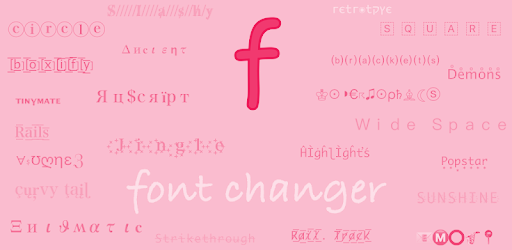Fonts Changer is a tool that allows you to change the font of your text to a different style or type. It is commonly used in design and publishing, as well as in social media and messaging apps to add a unique touch to your messages.
Using a Font Changer tool, you can change the style, size, and color of your text, and even apply special effects to create eye-catching graphics. Many Font Changer tools are available online, either as standalone software or as web-based applications that allow you to customize your text without installing anything on your computer.
Some popular Font Changer tools include Font Generator Fancy, Canva, Adobe Fonts, Google Fonts, and Font Squirrel. These tools provide a vast selection of fonts to choose from, ranging from classic serif and sans-serif fonts to more decorative and unique styles.
Here are some related keywords to Font Changer:
- Typography
- Typeface
- Font family
- Font size
- Font style
- Text effects
- Graphic design
- Font generator
- Font library
- Web fonts
- Custom fonts
- Font pairing
- Font manager
- Font editor
- Font conversion
The Importance of Font Changes in Design and Typography
In the world of graphic design and typography, font changes are an essential element of creating visually appealing and effective designs. Typography is the art of arranging type to make written language legible, readable, and appealing when displayed. Choosing the right typeface, font family, font size, and font style can make a big difference in how your message is received and understand by peoplee. Let’s explore the importance of font changes and how they can impact your designs.
Typography and Its Importance
Typography is a fundamental aspect of design that involves choosing the right font, size, color, and style to create legible, readable, and visually appealing text. The way that you present your text can affect the overall message and impact of your design. Typography is crucial in design and is used in everything from websites and logos to business cards and posters. Typography can communicate a wide range of emotions, from fun and playful to serious and professional.
Typeface, Font Family, Font Size, and Font Style
In typography, a typeface is a set of fonts that share the same design features. For example, Times New Roman is a typeface that includes several fonts, such as regular, bold, and italic. A font family is a group of typefaces that share a common design style, such as sans-serif or serif. Choosing the right font family can be challenging, as it depends on the purpose of your design, your audience, and your brand’s identity.
Font size is another important aspect of typography. Choosing the right font size depends on the medium you’re using and the distance between the viewer and the text. For example, if you’re designing a billboard, you’ll need a larger font size than if you’re designing a brochure. Font style is also essential, as it can convey a wide range of emotions and messages. For example, italicized text can convey a sense of emphasis or importance, while bold text can indicate headings or subheadings.
Text Effect and Graphic Design
Text effect can enhance the impact of your typography and make it stand out. The effects can include shadows, gradients, outlines, and bevels. Text are often used in graphic design to create depth, contrast, and visual interest. When using text effects, it’s essential to make sure that they don’t distract from the message and are appropriate for the medium you’re using. For example, a neon glow effect might be appropriate for a nightclub flyer but might not be suitable for a financial report.
Font Generator and Font Library
A font generator is a tool that allows you to create custom fonts or modify existing ones. Generators can be standalone software or web-based applications. This generators can provide a wide range of options, from customizing existing fonts to creating entirely new ones. Font can be useful for creating unique designs or ensuring that your typography matches your brand’s identity.
A font library is a verity of fonts that can be used in anywhere. Font libraries can include both free and paid fonts, and they can be installed on your computer or used online. A font library can provide a vast selection of fonts to choose from, making it easier to find the right font for your design. Some popular font libraries include Google Fonts, Adobe Fonts, and Font Squirrel.
Web Font
These are the fonts that are designed for use on the web. They are Design for use on digital screens and are often available through online font libraries. These fonts can provide a consistent look and feel across different devices and browsers, making it easier to maintain your brand’s identity.
Custom Fonts
Custom fonts are unique fonts that are created specifically for a particular project or brand. Unlike traditional fonts that are widely available for anyone to use, custom fonts are designed to be exclusive to a specific company or product. Custom fonts can be made from beginning, or they can be latest versions of existing fonts. Designing a custom font can be a time-consuming and technical process. Many designers choose to work with a type foundry or a professional font designer to create a custom font that meets their specific needs. Custom fonts can be expensive, but they can also provide a unique and recognizable brand identity.
Font Pairing
It is the process of choosing two or more fonts that complement each other and work well together in a design. It is important because it can make your designs more visually appealing and can help emphasize the hierarchy of your content. For example, using a sans-serif font for headings and a serif font for body text can create a clear and readable design.
There are many ways to approach font pairing. You can choose fonts from the same family or from different families, but it’s essential to make sure they don’t clash or look too similar. Many online tools and resources can help you find font pairings that work well together, such as Font Generator Fancy, Google Fonts’ font pairings and Typewolf’s font recommendations.
Font Manager
A font manager is software that allows you to install, organize, and manage your fonts. Font managers can be useful for designers who work with many different fonts and need to keep them organized and easily accessible. Font managers can help you preview, activate, and deactivate fonts, as well as organize them into collections or sets.
There are many font managers available, both free and paid, that can help you manage your fonts. Some popular font managers include FontExplorer X, Suitcase Fusion, and NexusFont. Font managers can save you time and help you keep your fonts organized and ready for use in your designs.
Font Editor
A font editor is software that allows you to create, edit, and customize fonts. Font editors can be useful for designers who need to create custom fonts that match their brand’s identity or unique design requirements.
There are many font editors available, both free and paid, that can help you create and edit fonts. Some popular font editors include Font Generator Fancy, FontLab, Glyphs, and FontForge. These editors can be challenging to use and require a lot of technical knowledge, but they can be powerful tools for designers who need complete control over their fonts.
Font Conversion
It is the process of converting a font from one file format to another. It can be necessary if you need to use a font in a specific file format that is not available in the original font file. For example, you may need to convert a font from TrueType to OpenType if you need to use it in a specific software program.
There are many online font conversion tools available that can help you convert fonts. Some popular font conversion tools include Font Generator Fancy, Online Font Converter, TransType, and FontLab Studio. Font conversion can be a useful tool for designers who need to work with fonts in different file formats or software programs.
Conclusion:
In conclusion, font changes are an essential part of typography and design. Choosing the right typeface, font family, font size, and font style can make a significant impact on the overall message and impact of your design. Understanding font pairing, font management, font editing, and font conversion can help you make the most of your typography and create visually appealing and effective designs.

